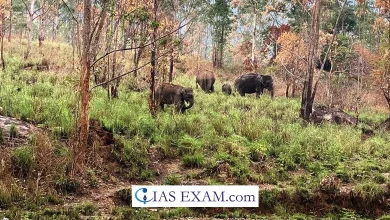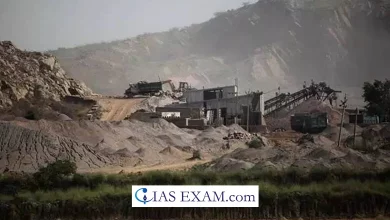Daily Current Affairs for UPSC
Climate Change Impacts on Human Rights
Syllabus- Environment [GS Paper-3]

Context
In recent years, courts around the world have been constantly asked to address the intersection of climate change and human rights.
Key Highlights
- The European Court of Human Rights’ decision against the Government of Switzerland highlights the failure to defend women senior residents from the impacts of climate change.
- The Supreme Court of India’s ruling affirms the right to be free from unfavorable climate impacts under constitutional provisions.
- It stated that people have a right ‘to be free from the unfavorable effects of climate change,’ mentioning Articles 14 (equality before law and the equal protection of laws) and 21 (right to life and personal liberty) of the Indian Constitution as the sources.
- These decisions mark a significant shift towards recognising climate change as a fundamental human rights issue.
Global Climate Crisis: A Threat to Human Rights
- The global climate crisis poses an existential danger to human rights, affecting individuals and communities across the world.
- The State of the Global Climate Report launched by the World Meteorological Organisation offers compelling evidence of the escalating effects of climate change.
- In 2023, several climate change indicators reached record levels, confirming it as the hottest year on record.
- This unprecedented heat was accompanied by other alarming trends, including ocean heat accumulation, sea level rise, Antarctic Ocean ice loss, and glacier retreat.
- These tendencies symbolize the profound pressure that the planet is under, with far-reaching consequences for human well-being.
India’s Climate Action and Vulnerability
- Highly Vulnerable Despite Significant Progress
-
-
- India, as one of the global’s fastest-growing economies, has made vast strides in addressing climate change.
- India has already achieved two of its Nationally Determined Contribution (NDC) goals, reducing the emissions depth of its GDP by 33% to 35% from 2005 level.
- India has also accomplished 40% cumulative electric power established ability from non-fossil fuel assets, ahead of the target year of 2030.
- However, in spite of those efforts, the country stays relatively susceptible to the damaging impacts of climate change.
-
- Population Vulnerability to Climate-Induced Disasters
-
-
- One of the important elements contributing to India’s vulnerability is the geographical distribution of its population.
- More than 80% of India’s population resides in districts which might be at high hazard of climate-induced disasters, which includes floods, cyclones, droughts, and heatwaves.
- These extreme climate events not only disrupt livelihoods but also exacerbate current socio-financial inequalities, disproportionately affecting vulnerable communities, along with smallholder farmers, rural populations, and marginalised companies.
-
- Intersection of Climate Change with Socio-economic and Environmental Challenges
-
- Moreover, the impacts of climate change intersect with different socio-economic and environmental challenges in India, amplifying their outcomes.
- For example, speedy urbanisation and unplanned development exacerbate the vulnerability of urban populations to climate-related disasters, such as flooding and landslides.
Plausible Legal Frameworks for India’s Climate Action
- Adoption of an Overreaching law
-
-
- One method to enhancing India’s climate governance is the adoption of an overarching law especially focused on climate change.
- Such a law might provide a consolidated and coherent framework for addressing numerous aspects of climate movement, such as mitigation, model, finance, and capacity-constructing.
- By codifying climate-related objectives, targets, and strategies into law, an overarching regulation can provide legal certainty and stability, guiding long-term planning and investment decisions.
-
- Lessons from Global Climate Framework Laws
-
- A report by the London School of Economics and Political Science analysed climate change framework laws throughout 60 nations, highlighting their role in setting up the strategic direction for nationwide climate policies.
- Countries which include Germany, Ireland, New Zealand, Finland, South Korea, South Africa, and the Philippines have enacted comprehensive climate legal guidelines that cross past meeting worldwide commitments and conventions.
- These legal guidelines have facilitated the mobilisation of public sector assets, multiplied potential for climate movement, and promoted cross-sectoral collaboration.
Some Other Measures to Enhance India’s Climate Governance
- Holistic Approach to Climate Policies
-
-
- Furthermore, India’s climate rules should undertake a holistic method that integrates climate concerns into broader improvement planning and choice-making procedures.
- This involves mainstreaming climate adaptation and mitigation measures across sectors, including agriculture, water assets, power, transportation, and urban planning, to ensure a coordinated and synergistic reaction to climate change.
-
- Localised Approaches and Inter-sectoral Collaboration
-
-
- Localised Approaches to climate movement, along with inter-sectoral collaboration, are important for addressing the various and context-specific challenges posed by climate change.
- By engaging stakeholders to the close level and fostering collaboration throughout sectors, governments can broaden focused and effective strategies to construct resilience, lessen vulnerabilities, and promote sustainable development.
-
- Integration of Sustainable Development Goals (SDGs)
-
-
- Localised approaches to climate movement regularly intersect with broader SDGs, along with poverty relief, food security, access to clean water and sanitation, and gender equality.
- By integrating climate considerations into neighborhood-stage planning and implementation of the SDGs, governments can promote synergies and co-blessings throughout sectors, maximise resource performance, and decorate the general resilience and sustainability of communities.
-
- Empowering Civil Society
-
-
- Civil society performs an essential position in advocating for climate action, promoting environmental justice, and preserving governments and companies responsible for their actions.
- Empowering civil society organisations (CSOs) and promoting rights-based dialogue on climate change are essential for promoting inclusive decision-making processes, ensuring transparency, and advancing environmental and social justice.
-
- Ensuring Inclusivity and Representation
-
-
- Promoting inclusivity and diversity inside civil society is important for ensuring that the voices and perspectives of marginalised and prone communities are heard and integrated into climate policies and programs.
- CSOs need to strive to represent the interests of diverse stakeholders, including women, indigenous peoples, youth, persons with disabilities, and other marginalised groups, in climate decision-making processes.
-
- Promoting Rights-Based Dialogue
-
- A rights-based approach to climate action recognises that climate change disproportionately impacts prone and marginalised communities.
- It violates their essential human rights, along with the rights to life, health, food, water, and livelihoods.
- By framing climate change as a human rights issue, CSOs can recommend for guidelines and initiatives that prioritise the wishes and hobbies of affected communities and promote environmental justice.
Conclusion
- The convergence of legal decisions, scientific evidence, and policy imperatives underscores the urgent need to address climate change as a human rights crisis.
- By recognising the interdependence of environmental sustainability and human well-being, nations can chart a path towards climate resilience and justice.
- Empowering communities, strengthening legal frameworks, and fostering inter-sectoral collaboration are essential steps towards realising a future free from the adverse impacts of climate change.
Source: The Down to Earth
UPSC Mains Practice Question
Q.Describe the major outcomes of the 26th session of the Conference of the Parties (COP) to the United Nations Framework Convention on Climate Change (UNFCCC). What are the commitments made by India in this conference? (2021)





.png)



